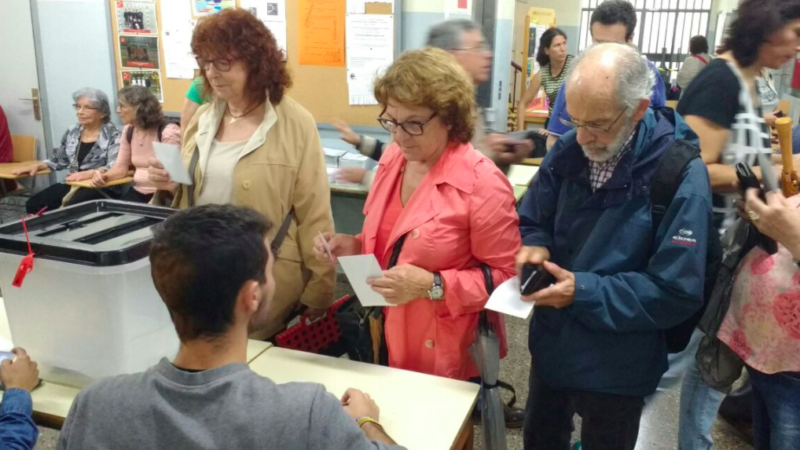The 'revolt' against Madrid follows years of grassroots movements empowering people at a local, neighbourhood level.

To truly understand events in Catalonia you must look to the long-term, local, movements for democracy and autonomy, writes Kate Shea Baird in Barcelona.
Since Sunday’s referendum on independence in Catalonia, events are moving so rapidly that one fears any analysis longer than a tweet will be irrelevant by the time it’s published.
Nevertheless, the vote itself, and events leading up to it, are worth reflecting on as a guide to what may happen in the future.
On the 1st of October, 2.2 million people voted on Catalan independence, in a poll that the central government had insisted wouldn’t happen.
In the end, just 400 of a total of 2,315 polling stations were shut down, despite the deployment of military police and the use of force. Let that sink in. The Catalan government and thousands of ordinary people effectively took on the might of the Spanish state and won.
The level of popular organization and commitment required to allow the referendum to take place was simply extraordinary.
Days before, a network of citizens in hundreds of municipalities smuggled and stored ballot boxes in their homes at enormous personal risk, dodging the Spanish intelligence services that were hunting for them.
On Friday afternoon, parents and neighbours occupied schools designated as polling stations, preventing them from being cordoned off by the police. On the day of the vote, voters formed human shields at polling stations from 5am until they closed at 8pm.
Those unlucky enough to be at a polling station that was stormed by the Spanish police or the Civil Guard faced police brutality on a scale unseen in Europe for decades: batton charges, rubber bullets and sexual assault.
Over 800 people have been treated by the Catalan health services for injuries inflicted by the police.
The celebration of the referendum under these exceptional circumstances reveals two important truths. First, that support for independence is as deep as it is broad.
The referendum proved the ability of the independence movement to spontaneously organise at neighbourhood level, without instructions from the government or civil society leaders.
It also demonstrated that supporters of independence are willing to put themselves at legal and physical risk to defend their cause. The myth that this is a movement of, or controlled by, elites is dead.
Second, the referendum highlighted the tacit alliance between supporters of independence, who make up around half of the electorate, and the 80% who support the principle of self-determination.
Many in this latter group helped to defend polling stations, whether or not they went on to vote themselves. It is notable that, of the half of the 7.5 million strong population opposed to independence, just 5,000 turned out to the anti-independence rally in Barcelona on the eve of the vote.
While support for, and opposition to, independence may be numerically equivalent, social mobilisation to defend the status quo is virtually non-existent.
Over recent weeks, the streets of Barcelona have echoed with the cry of “the streets will always be ours”. With every day that passes, this chant seems less like an aspiration and more like a statement of fact.
As I write, groups of local residents are using peaceful resistance to drive the national police out of small towns around Catalonia, a general strike has been called, and neighbourhood organising to defend the referendum result continues.
The future is uncertain, but one thing is clear: whether or not the Catalan Parliament declares independence, and whether or not such a declaration is recognised internationally, real sovereignty in Catalonia is already being built by people on the ground, street by street.
Kate Shea Baird has lived in Barcelona since 2008. She writes on Catalan and Spanish politics and is an activist in the Municipalist movement. She tweets here.
To reach hundreds of thousands of new readers and to make the biggest impact we can in the next general election, we need to grow our donor base substantially.
That's why in 2024, we are seeking to generate 150 additional regular donors to support Left Foot Forward's work.
We still need another 124 people to donate to hit the target. You can help. Donate today.




One Response to “Real sovereignty had already been built on the streets of Catalonia well before the referendum”
Alasdair Macdonald
Thank you, Ms Baird.
To the editor of LFF, employing the principle of charity, I suppose this is an example of ‘better late than never’. The lack of any statement from many within the Labour Party, including the leadership, until the appalling brutality in Catalunya was broadcast on Sunday, was shameful. The comments of some within the Labour Party since Sunday have been shocking, They could be paraphrased as “Senor Rajoy might be a Falangist, but he’s OUR Falangist.”
Whether one supports independence for Catalunya or not, the population ought to have been allowed to vote without hindrance or intimidation. On the Andrew Marr Show on Sunday, Mrs May, in a different context, stated, without qualification, “Is it a mistake to give people the right to vote? I don’t think so.” What is the view of the Labour Party?